模块5 Unit 13 People Lesson 1 EQ:IQ 课件(共101张幻灯片)
文档属性
| 名称 | 模块5 Unit 13 People Lesson 1 EQ:IQ 课件(共101张幻灯片) |

|
|
| 格式 | zip | ||
| 文件大小 | 425.5KB | ||
| 资源类型 | 教案 | ||
| 版本资源 | 北师大版 | ||
| 科目 | 英语 | ||
| 更新时间 | 2021-11-13 21:31:41 | ||
图片预览

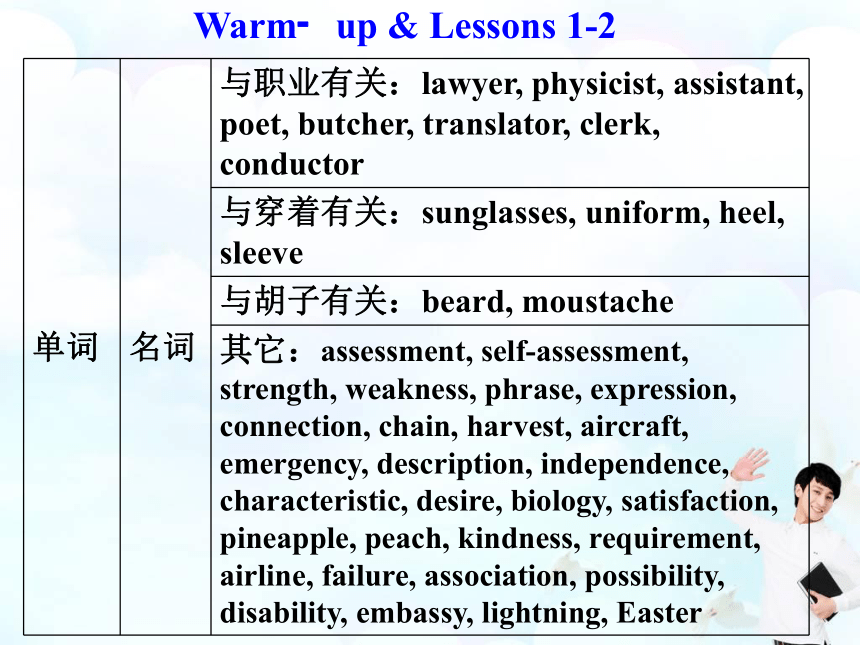
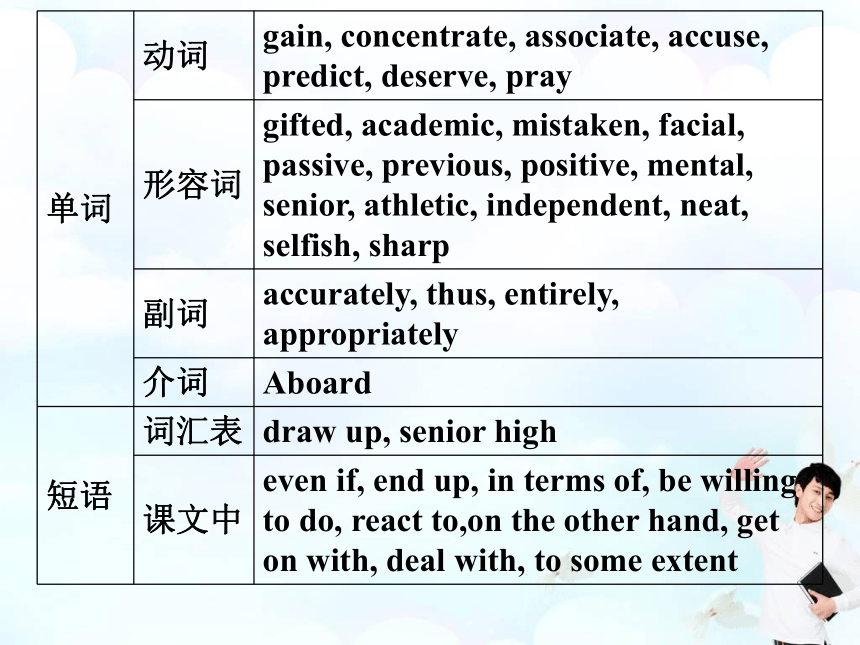
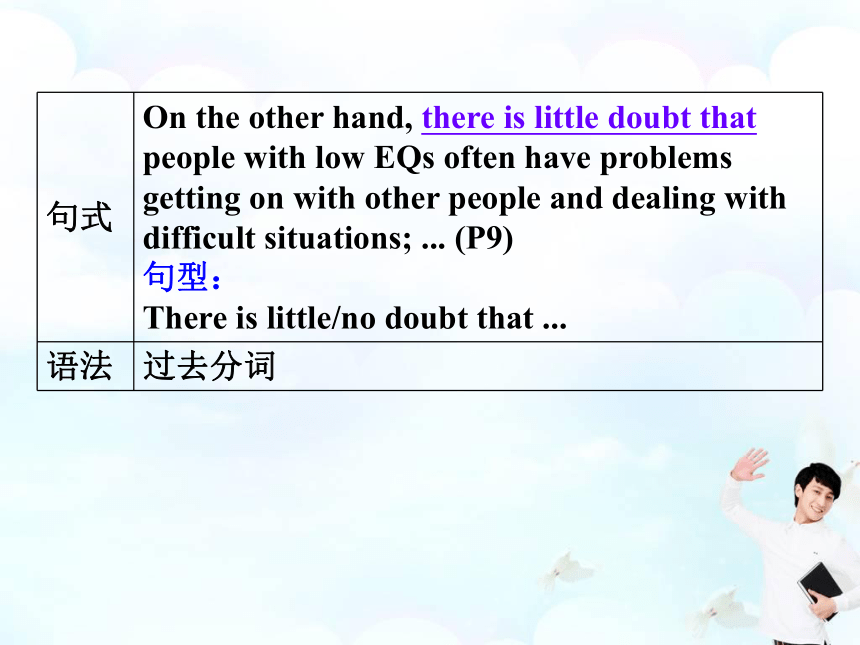
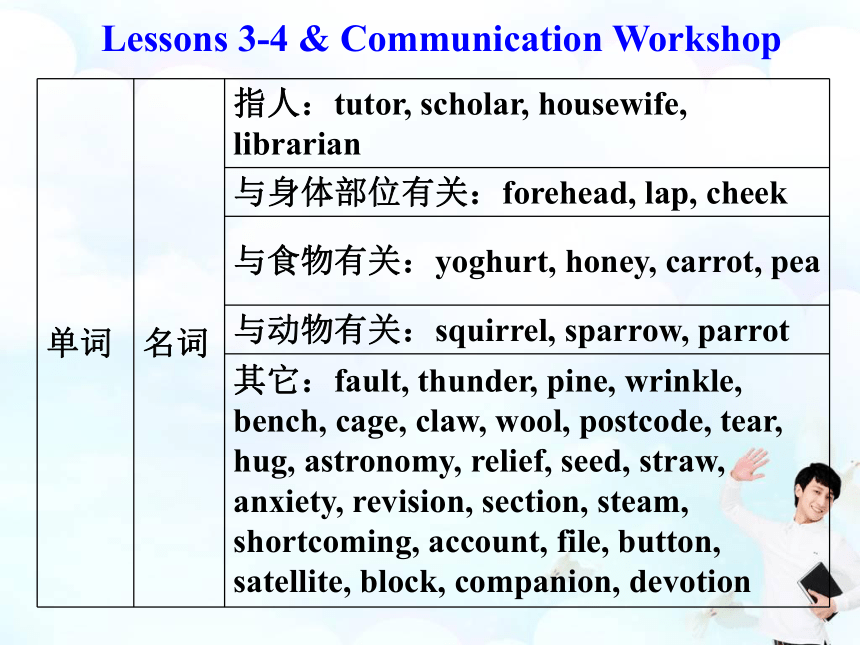
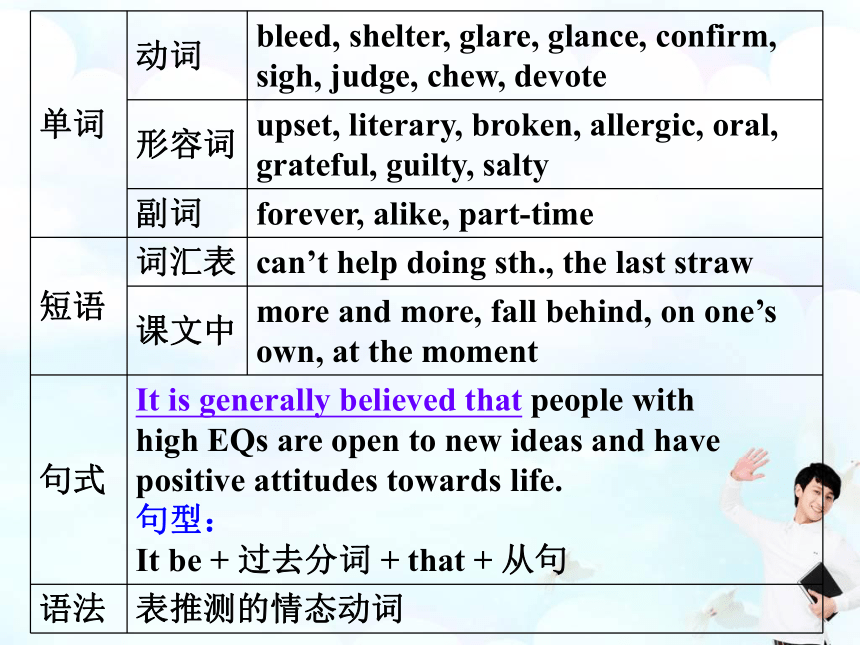

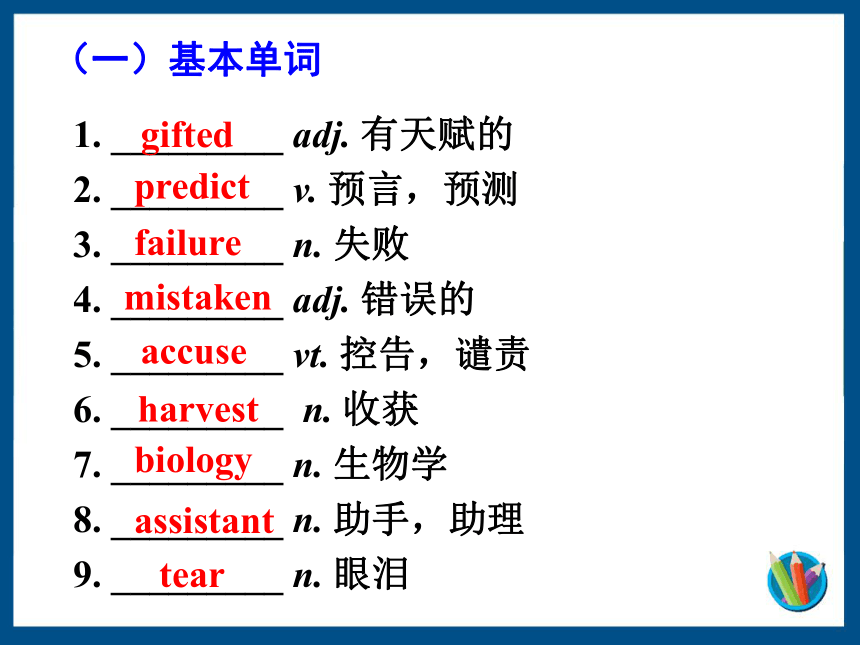
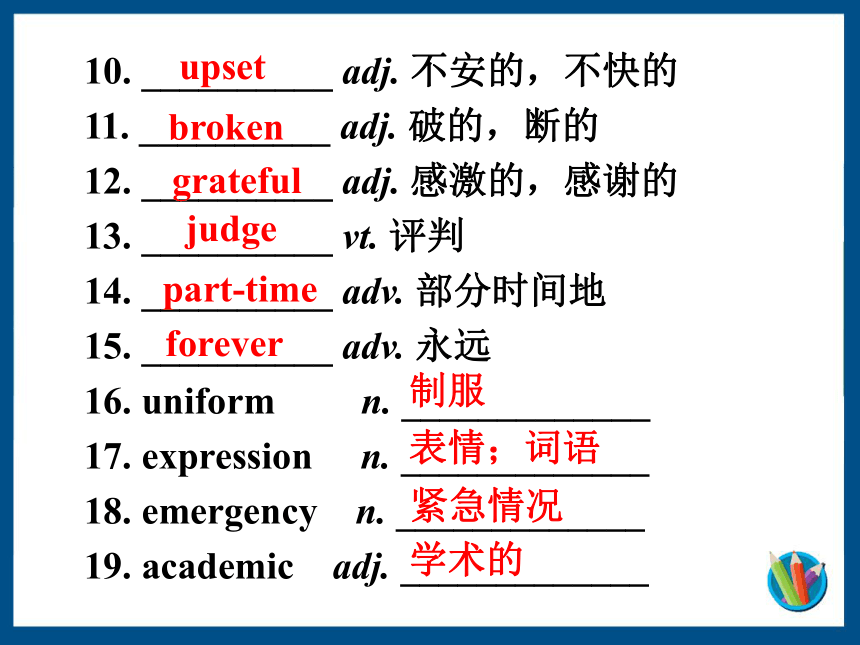
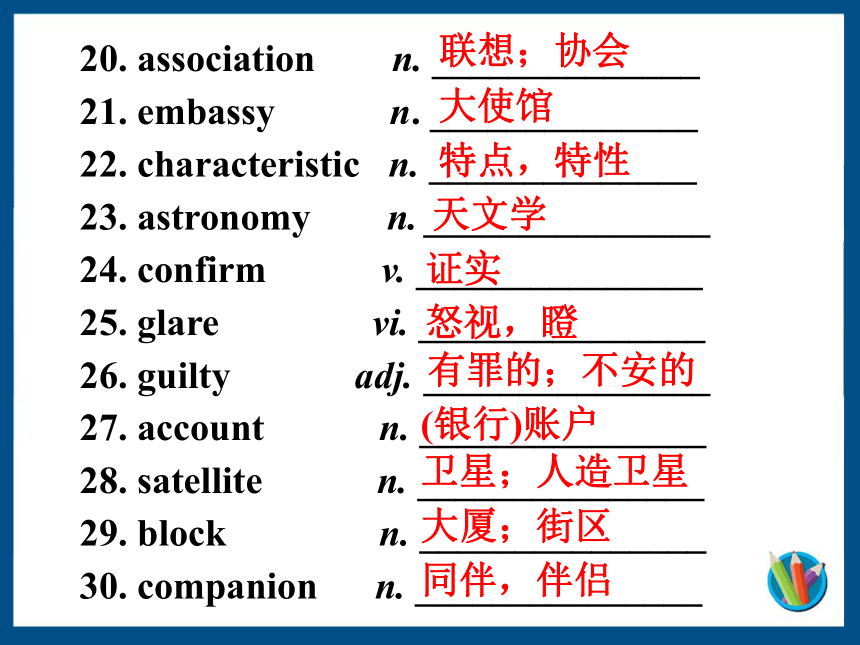

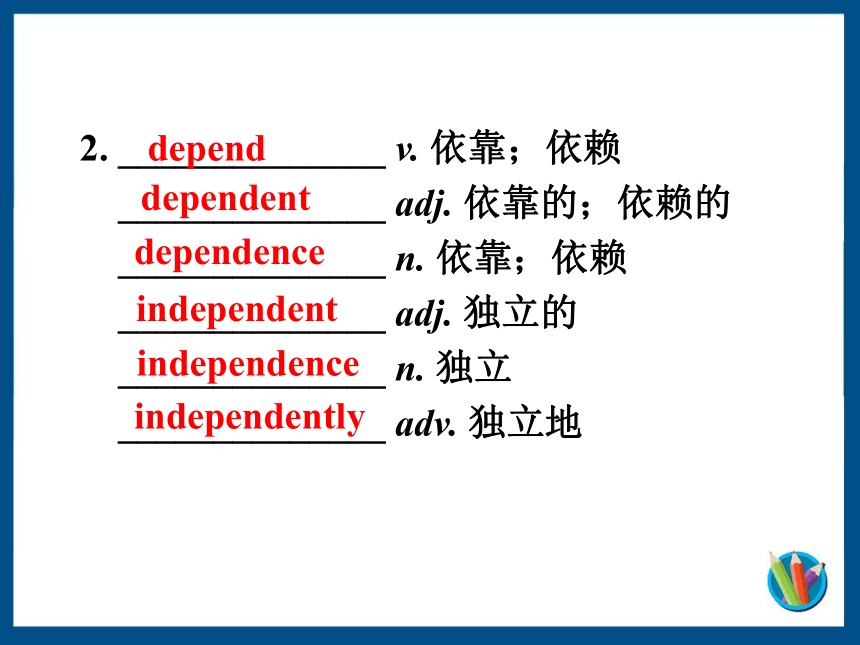
文档简介
课件101张PPT。Unit 13 PeopleWarm?up & Lessons 1-2Lessons?3-4 & Communication Workshop知识清单1. _________ adj. 有天赋的
2. _________ v. 预言,预测
3. _________ n. 失败
4. _________ adj. 错误的
5. _________ vt. 控告,谴责
6. _________ n. 收获
7. _________ n. 生物学
8. _________ n. 助手,助理
9. _________ n. 眼泪accuse giftedpredictfailuremistaken(一)基本单词harvestbiologyassistanttear10. __________ adj. 不安的,不快的
11. __________ adj. 破的,断的
12. __________ adj. 感激的,感谢的
13. __________ vt. 评判
14. __________ adv. 部分时间地
15. __________ adv. 永远
16. uniform n. _____________
17. expression n. _____________
18. emergency n. _____________
19. academic adj. _____________upsetforever broken gratefuljudgepart-time制服表情;词语紧急情况学术的20. association n. ______________
21. embassy n. ______________
22. characteristic n. ______________
23. astronomy n. _______________
24. confirm v. _______________
25. glare vi. _______________
26. guilty adj. _______________
27. account n. _______________
28. satellite n. _______________
29. block n. _______________
30. companion n. _______________联想;协会怒视,瞪 大使馆特点,特性天文学证实同伴,伴侣 有罪的;不安的(银行)账户卫星;人造卫星大厦;街区1. ________ prep. 像 v. 喜欢
________ adj. 相像的
________ v. 不喜欢
_________ adj. 不像的 prep. 不像
_________ adj. 可能的
_________ adj. 不太可能的unlikelikealikedislike(二)派生单词likelyunlikely2. ______________ v. 依靠;依赖
______________ adj. 依靠的;依赖的
______________ n. 依靠;依赖
______________ adj. 独立的
______________ n. 独立
______________ adv. 独立地independentdependdependentdependence independenceindependently3. _________ adj. 能够的
_________ adj. 不会的;不能的
_________ adj. 残疾的
_________ n. 能力
__________ n. 残疾; 无能
__________ v. 使能够; 使成为可能
4. ____________ adj. 忧虑的; 担心的
____________ adv. 忧虑地; 担心地
____________ n. 忧虑; 担心 ableunabledisabled abilitydisabilityenable anxiousanxiouslyanxiety5. ____________ v. 使满意;满足
____________ n. 满足;满意
____________ adj. 满意的
____________________ adj. 令人满意的
______________________ adv. 令人满意地
__________ v. 不满足; 使......感到不满satisfying/satisfactorysatisfysatisfactionsatisfied satisfyingly/satisfactorilydissatisfy6. _____________ n. 自己
_____________ adj. 自私的;利己的
_____________ adv. 自私地
_____________ n. 自私
______________ adj. 无私的
7. __________ vt. 献身于
__________ n. 奉献
_________ adj. 献身的;忠诚的;忠实的selfless/unselfish selfselfishselfishlyselfishnessdevotedevotiondevoted1. ___________________________
致力于; 献身于
2. ___________ 就......而言;从......角度看
3. _____________ 愿意做某事
4. ____________ 过着……的生活
5. ____________ 与……相处
6. ____________ 单独地; 独自地
7. ____________ 迷路
8. ___________ 落后; 掉队be willing to be devoted to/devote oneself to in terms of(三) 短语fall behind lead a … lifeget on withon one’s ownget lost9. ___________ 怒视
10. __________ 一瞥
11. _________________ 忍不住做某事
12. _________________ 指控某人
13. be involved in __________________
14. react to __________________
15. concentrate on _______________
16. talk sb. into doing sth. _______________
17. come up with ___________________accuse sb. of glare atglance atcan’t help doing sth.劝服某人做某事 参与;与……有关联对……做出反应集中精力于 想出 18. tell sb. off ______________
19. to be honest ______________
20. apologize for sth. ______________
21. thanks to ______________
22. more and more ______________
23. end up doing ______________
24. be likely to do ______________因某事道歉 责骂某人老实说可能做某事由于;多亏越来越以……告终核心要点(一)单词 matter
【归纳】
n. 意为“物质”
e.g. Most of the matter you see every day
comes in one of three forms — solid,
liquid and gas.
“毛病,问题”
e.g. There’s something the matter with your
eyes.
“问题,事情”
e.g. That is a matter of life and death.“重要性”
e.g. People have known and recognized its
matter.
vi. 意为“要紧,重要”
e.g. It doesn’t matter if the shoes feel a bit
tight. They’ll stretch (撑大) with wearing.
no matter引导让步状语从句,意为“无论,不管”,须与what, who, when, where, how等连接代词或连接副词连用,意义上相当于whatever, whoever, whenever, wherever, however等。
e.g. No matter how late she comes back, her
mother will wait for her to have supper.2. deserve【归纳】
是动词,意为“应当,值得”,其后可接名词、代词或不定式。
e.g. She deserves a reward for her efforts.
That good-hearted girl married her
prince finally.?She?deserved it.?
It’s true she made a mistake but she
hardly deserves to lose her job.注意: deserve后也可接动词-ing形式, 此时动词-ing形式的主动形式表示被动意义,即: deserve doing = deserve to be done。
e.g. He deserves praising for his contribution
to the company. = He deserves to be
praised for his contribution to the
company.
【拓展】
deserving adj. 意为“值得的,应得的”。
e.g. The money should be given to a
deserving cause.【运用】根据汉语意思补全下列句子(每空一词)。
1. 这位战士的英勇行为值得嘉奖。
The soldier _______ ___ ______ for his acts
of bravery.
2. 你做的这些好事定会给你带来幸福。
You _______ __ __ happy for all the good
things you do.deserves the award??????? deserve to be3. desire【归纳】
desire意为“期望,渴望;要求”, 既可作名词,也可作动词。
◆作名词时,可用于desire for sth.;desire to do sth.;跟that引导的同位语从句。
◆作动词时,可用于desire sth.;desire to do sth.;desire sb. to do sth.;跟that引导的宾语从句。
[注意] desire后跟从句时,从句中的谓语动词用虚拟语气,即should +动词原形,
should可以省略。【运用】翻译下列句子。
1. 他没有名利心。(n. )
2. 他渴望致富。(n. )
3. 我们大家都渴望幸福和健康。(v. )
4. 她希望赢得这场比赛。(v. )???? He has no desire for wealth or fame.He has a desire to become rich.We all desire happiness and health.She desired to win the game.4. upset【归纳】upset既可作形容词,也可作动词。
★作形容词时,意为“难过的,不高兴的”,
可与about连用,也可接that从句。
★作动词时,意为“使烦恼,使心烦意乱,
使生气”。如:【运用】翻译下列句子。
1. 我的母亲老是睡不好因为她为很多事情
难过。(用about结构完成)
My mother doesn’t sleep well because
she is upset about many things.
2. 让她难过的是他走的时候连再见都没
说。(用that从句完成)
She was upset that he had left without
saying goodbye.
3. 你别为这事烦恼了,咱们就只当它没发生过。
Don’t upset yourself about it — let’s just
forget it ever happened.【归纳】
作动词,意为:判断,常构成固定搭配:judging by/ from 根据……判断;评价;判决。
作名词,意为:(比赛等的)裁判员;法官,审判员。
【拓展】 judgment n. 判断;看法;评价
make a judgment 做出判断
in one’s? judgment在……看来
pass judgment on对……宣判5. judge【运用】根据括号内的汉语提示,完成下列句子。
1.?A man should ____________________ (根据
行为判断), not his words.
2.?Can you _____________________ (断定该
走哪条路吗)?
3.?It is still too soon to _______________ (做
出判断) about the result of the experiment.be judged by his deeds judge which way to take make a judgment6. concentrate
【归纳】
concentrate是动词,意为:①集中(注意力),聚精会神(常用搭配:concentrate on sth. / doing sth.);②使……集中(或集合、聚集)。
【拓展】
concentration n. 聚精会神,集中concentrated adj. 集中的,浓缩的【运用】翻译下列句子。
1. I can’t concentrate on my studies with all that
noise going on.
吵闹声不绝于耳,我无法集中精神学习。
2. Water companies should concentrate on
reducing waste instead of building new
reservoirs (水库).
自来水公司应该把注意力放在减少水资源浪费
上而不是修建新的水库。
3. Most of the country’s population is
concentrated in the north.
这个国家大部分的人口都集中在北部。7. predict
【归纳】
predict是动词, 意为“预言,预测,预报”,后可接名词(短语)或从句,也常用于be predicted to do结构中。
【拓展】
prediction n. 预言,预报,预告
predictor n. 预示物,预测器
predictable adj. 可预见的,可预料的【运用】根据汉语意思补全下列句子(每空一词)。
1. 要预测出谁将获胜是不可能的。
It’s impossible to _______ ____?___ ____.
2. 预计韩国将成为最受中国游客喜欢的目的地之一。
Korea __ ________ __ __ one of the most popular destinations for Chinese tourists.predict who will win????? is predicted to be? 8. accuse
【归纳】
accuse是动词,意为“控告,谴责”。常用搭配:accuse sb.; accuse sb. of (doing) sth.。如:
“It wasn’t my fault.” “Don’t worry, I’m not accusing you.”
Who accused you of such a thing?
I don’t think anyone can accuse me of not being frank.【辨析】accuse & charge
两者都可作“指控”讲,但与二者搭配的介词不同,具体用法如下:
accuse sb. of sth.,charge sb. with sth.。
【拓展】
与accuse ... of ... 结构类似的短语还有:
inform sb. of sth. 通知/告诉某人某事
remind sb. of sth. 提醒某人某事
rob sb. of sth. 抢劫某人某物
warn sb. of sth. 提醒/警告某人某事
cure sb. of sth. 治愈某人的病,矫正某 人的某不良行为9. pray vt. & vi. 祈祷,祷告
【归纳】
pray 可与介词to连用或后跟that从句。
常见搭配:
pray for ... 为……祈祷,乞求,恳求
e.g. Alice prayed to God for an end to her
sufferings.
We prayed that she would recover from
her illness.
Let us pray for the victims of this terrible
disaster.
We pray you to set the prisoner free.10. devote
【归纳】
devote是动词,意为“专心致志于,献身于”。常用短语:devote oneself to sb. / sth. 献身,致力于……;devote sth. to sth.把……用于。
【拓展】
devoted adj. 忠实的,挚爱的
devotion n. 奉献,忠诚【运用】用devote的适当形式填空。
1. Jack ________ himself to the protection of
animals, and he has never regretted this.
2. Sam started to study biology and decided to
________ his whole life to the science.
3. The couple were entirely ________ to each
other all their lives.
4. It is his ________ to his job that wins him all
the students’ respect.devoteddevotedevoteddevotion11. account
【归纳】
★作名词时,意为“(银行)账户,账目,叙述,报告”。常用短语:on account of由于,因为;take sth. into account考虑到……,顾及……;give an account of解释;on no account / not ... on any account 绝不要,无论如何不要。
★作动词时,意为“认为是,视为”。常用短语:account for是……的说明(或原因),解释,说明。 【运用】用account的相关短语完成下列句子,每空一词。
1. She ____ __ _______ (描述) of what she saw
in China.
2. The plane didn’t take off on time
___ _______ __ (因为) the bad weather.
3. ___ __ _______ (决不) will you miss the
chance.
4. The nurse was unable to _______ ___ (说明)
the disappearance of? the patients that were
under her care.on account ofOn no account???? ? account for?gave an account?? ? 12. glare
【归纳】作名词时,意为“刺眼的强光,耀眼的光” ; “怒视的目光,愤怒的表情”。
????? glare作不及物动词时,意为“怒视”,常和介词at搭配;意为“发耀眼的强光”。
【辨析】glare at; stare at; glance at
glare at意为“怒目而视,恶狠狠地盯着”,带有生气的感彩。
stare at意为“凝视,盯着看”,仅仅表示动作,而不带有感彩。
glance at意为“匆匆一瞥,迅速地看一眼”,强调这个动作的速度很快。【拓展】
glaring adj. 耀眼的,过于鲜艳的,明显的
【运用】根据中英文提示,完成下列句子。
1. 她擦了擦脸上的面粉,瞥了一眼总是捣乱
的女儿。
She wiped the flour off her face and
_______ ___ her daughter who always
made trouble for her.
2. 别那样做。难道你喜欢被人盯着看吗?
Don’t behave like that. Do you like to be
_______ __?glanced atstared at3. 他恶狠狠地盯着我,好像立刻要把我吞了
一样。
He _____ __ me as if he would swallow me
at once.glared at (二)短语1. in terms of【归纳】
in terms of意为“就……来说” ,“用……的字眼”,也可表示为in ... terms,意为“根据,按照” 。think in terms of doing sth. 表示“计划/打算做某事”。
【拓展】
与terms相关的其他短语:
on good / bad terms with sb. 同某人关系好/不好
on one’s terms 依照某人的条件under the terms of… 根据……的条件
in terms 明确地,用确切的词语
【联想】
英语中的 in ... of 结构还有:
in charge of 负责? ? ? ? ? ? ? ? ? ? ? ? ? ?
in search of 寻找
in honor of 向……表示敬意???? ?????
in need of 需要
in favor of 赞成;支持? ? ? ? ? ? ? ? ? ?
in spite of 不管;尽管
in case of 如果;万一? ? ? ? ? ? ? ? ? ?in place of 代替
in memory of 纪念? ? ? ? ? ? ? ? ? ? ? ? ?
in possession of 占有
in face of 面临? ? ? ? ? ? ? ? ? ? ? ? ? ? ? ?
in control of 控制;管理;掌握
in praise of 赞扬???????【运用】翻译下列句子。
1. This is a small country in terms of size and
population.
______________________________________
2. We should let children read in terms of their
own interests.
______________________________________就面积和人口而言,这是一个小国家。 我们应该让孩子们根据自己的爱好来阅读。 2. 含draw的短语
【归纳】
★draw up意为:①(车辆)到达某处停下;②制订,起草; ③使靠近。如:
A car drew up, and a smartly dressed woman got out.
Plans are being drawn up to develop the inner ring road in the town centre.
Bobby drew a chair up to the table.
★draw back意为:①移开,后退;②撤消,撤回。如:
The little boy draws back in shock.The firm drew back from its agreement.
★draw in 意为“(白昼) 渐短”,其反义词为draw out。如:
In October the days start drawing in.
【运用】用适当的介词或副词填空。
1. With the approach of spring, the days
begin to draw _____ quite noticeably.
2. You should draw _____ a list of all the
things you want to do.
3. We drew _____ from taking our
neighbours to court. ? ??inupback3. talk sb. into doing sth. 说服某人做某事
【拓展】
persuade sb. to do sth.
说服某人做某事
persuade sb. into doing sth.
(成功)说服某人做某事
try to persuade sb. to do sth.
试图说服某人做某事
advise sb. to do sth.
劝某人做某事(不涉及是否成功)4. can’t help doing 禁不住要做某事,无 法抑制做某事
【拓展】
can’t help but do 忍不住做某事
e.g. Whenever I hear the story, I can’t help
crying.
I cannot help wondering about that girl.
You can’t help but respect them.5. be likely to do sth. 可能做某事
【归纳】
be likely to do sth. 可与It is likely that ... 换用。如:
He is likely to be late.
= It is likely that he will be late.
Tickets are likely to be expensive.
= It is likely that tickets will be expensive.【运用】根据所给汉语及英语提示完成下列句子,每空一词。
1. 明天他可能会来参加聚会。
He __ _____ __ come to the party tomorrow.
2. 这计划有可能取得成功。
__ __ _____ that the plan ___ _______.is likely toIt is likely will succeed(三)句式1. It is generally believed that people with high
EQs are open to new ideas and have positive
attitudes towards life. (P9)
句型:
It be + 过去分词 + that + 从句
人们相信……” 。在这个结构中,it是形式主语,that引导的从句作真正的主语。report, say, hope, know, think, prove等也有此用法。如:It was reported that several people had been arrested.2. On the other hand, there is little doubt that people with low EQs often have problems getting on with other people and dealing with difficult situations; ... (P9)
句型:
There is little/no doubt that ...
毫无疑问的是…… [that引导同位语从句]注意:
doubt 前有否定意义的词修饰时,其后的同位语从句由that引导;doubt前有肯定意义的词修饰时,其后的同位语从句由 whether或if引导。如:
There is no doubt that they know what they’re doing.
I have some doubt whether he will be fit in time for next Sunday’s match.(四)语法过去分词用法小结【归纳】
★过去分词作定语
过去分词作定语时,分词所表示的动作与被修饰的词之间存在逻辑上的动宾关系,且多表示已完成的动作。
单个的过去分词作定语,通常置于被修饰词之前,也可后置;过去分词短语作定语时,需置于被修饰词之后。
过去分词作定语时,可转换为定语从句。注意:及物动词的过去分词与逻辑主语(即它所修饰的名词)之间是被动关系,可以转换为谓语动词是被动语态的定语从句;不及物动词的过去分词与逻辑主语之间是主动关系(即只说明逻辑主语所处的状态、特点或特征等),可以转换为谓语动词是主动语态的定语从句。如:
a broken cup = a cup which has been broken(break是及物动词,表示被动和完成)
the fallen leaves on the ground = the leaves which have fallen on the ground (fall是不及物动词,说明主语的状态,表示动作已经完成)★过去分词作表语
【归纳】
过去分词作表语时,相当于形容词,与谓语动词构成系表结构,表示主语的性质、特征和状态(第一组例句)。
除系动词be外,look, seem, become等连系动词也可接过去分词作表语(第二组例句)。这类动词还包括get, sound, feel, remain, appear, turn等。
【拓展】过去分词作表语与被动语态的区别:过去分词作表语表示主语的特点或所处的状态;被动语态表示一个具体的动作,强调主语所承受的动作。如:We were amused to learn that he had made a foolish mistake.(过去分词作表语)
We were amused by his story and burst out laughing.(被动语态)
★过去分词作宾语补足语
【归纳】过去分词作宾语补足语时,分词所表示的动作与宾语之间存在逻辑上的动宾关系。常用于以下情况:
用在see, hear, watch, find, feel, think等表示感觉和心理状态的动词后面。如:
We can hear the windows beaten by the heavy rain drops.I found her greatly changed.
用在get, have, make, keep等表示“致使”意义的动词后面。如:
They managed to make themselves understood in very simple English.
Please keep us informed of the latest news.
用在like, order, want, wish等表示“希望、要求、命令”等意义的动词后面。如:
The boss won’t like such questions discussed at the meeting.
I wish the problem settled. 用在“with +宾语+宾补”结构中。如:
With many brightly-colored flowers planted around the building, his house looks like a beautiful garden.
★过去分词作状语
【归纳】
过去分词作状语时,可表示时间、原因、结果、条件、让步、方式或伴随等,过去分词所表示的动作与句子主语之间构成逻辑上的动宾关系(第一组例句)。 过去分词作状语时,可以在其前加when, although等连词,构成“连词+过去分词”结构(第二组例句)。这类连词还包括while, if, unless, once, as if等。【运用】写出下列谚语中划线部分在句中所作的成分,并翻译句子。
1. A burnt child dreads the fire. (?????? )
_______________________________________
2. A man becomes learned by asking
questions.? (?????? )
_______________________________________
3. A?penny?saved?is?a?penny?earned. (?????? )
_______________________________________定语一朝被蛇咬,十年怕井绳。表语善问者终成学问。定语省一文等于挣一文。4. United, we stand; divided, we fall. (?????? )
_______________________________________
5. Keep your mouth shut and your eyes
open.?? (?????? )
______________________________________状语团结则存,分裂则亡。 宾语补足语少说多看。表示推测的情态动词 情态动词must, can / could, may / might均可表示推测,它们可以对过去、现在或将来的情况作出语气强弱不同的推测。在运用情态动词表示推测时,我们应该着重把握以下两点:
1. 把握推测语气的特点,选择恰当的情态动词。
◆表示肯定的推测时,各情态动词语气从弱到强依次为might → may → could → can → must;表示否定的推测时,can’t / couldn’t语气较强,意为“不可能”;may not / might not语气较弱,意为“可能不”。注意: must的否定形式mustn’t不表示否定推测,而是表示“不许可”或“不应该”。
◆情态动词表示推测时,在用法上有一些限制:
must只用于肯定句中,意为“一定,准是”。如:
They have been working hard all day. They must? be tired.
can多用于否定句或疑问句中。could可用于各种句式。如:
Can the story be true?
Simon can’t be at home, for I saw him going shop- ping just now.You mustn’t smoke when you are walking around?in the wood. You could start a fire.
may / might用于肯定句和否定句中。如:
It may or may not rain. I’m not sure.
Peter might come with us tonight, but he isn’t very sure yet.
2. 确定被推测时间,正确判断动词时态。
◆对现在或将来的情况进行推测时,用“情态动词+ do”。如:
Mr. Reed looks pale. He may be ill.
If you don’t have a guide, you could lose your way.◆对此时此刻正在进行的情况进行推测时,用“情态动词+ be +动词-ing形式”。如:
At this moment, our teacher must be correcting our exam papers.
He could be doing his homework in his room now.
He may be waiting for you now.
◆对过去的情况进行推测时,用“情态动词+ have +过去分词”。如:
The road is wet. It must have rained last night.
Mars couldn’t have watched TV yesterday for he knew they would have an exam.He didn’t come to school yesterday. He might have been ill.
【拓展】在特定的语境中,“might / could + have +过去分词”不是对一件事情是否发生进行推测,而是表示本来可能发生但没有发生,或者本来可能完成却没有完成的动作,有时具有一定的感彩。
① might have done本可以做(却没有),有时表示很委婉的责备。如:
You might have phoned me, though you were busy then.
② could have done本可能做(却没有)。如:He could have caught the early bus, but he was delayed by helping a stranger.
【运用】用must, can / could, may / might及括号内动词的正确形式填空。
1. —Where is David?
—He ________ (be) at school. Classes begin at
8.
2. I’m absolutely sure! They ________________
(arrive) yesterday. I saw their tickets.
3. Are you joking? Mark ______________ (go)
to Paris. He doesn’t have enough money.must bemust have arrivedcan’t have gone? 4. They ____________________ (live) in New
York, but I’m not sure.
5. The concert _______________ (be) wonderful
last night. Fiore is a great conductor.may / might / could livemust have been(五)写作如何描写人物【写作指导】
一篇好的人物描写应包括以下内容:
1. 引入话题:简单介绍你所描写的人物,
如姓名、出生年月、背景等。
2. 中心内容:包括对人物外貌、个性特
征、兴趣爱好、个人经历等的描述。
3. 结论:陈述自己对该人物的看法。【常用表达】
1. 引入部分:
sb. was born in / on ..., his / her name is ..., at the age of ..., in his / her twenties / thirties ..., by the age of ...
2. 中心内容:◆描写外貌◆描写个性特征hard-working, warm-hearted, dependent, intelligent, humorous, confident, imaginative, brave, determined, energetic, active, educated, passive, friendly◆描写兴趣和爱好favourite, enjoy, like / love ... very much, be interested in, be fond of, be crazy about, be good at,
have a gift for, be born a ...3. 结论:
I am truly grateful to ...
I feel it a great honor to have ... accompany me ...
... is really an excellent person.
【写作任务】
假定你校正在举办英语征文大赛,要求描述一位你熟悉的人物。请你写一篇短文参赛。
注意:1. 词数110左右;2. 可以适当增加细节,以使行文连贯。【参考范文】
My favourite star
Wilber Pan, who was born on August 6th, 1980, is my favourite star. He was born in? West? Virginia,? United? States? and? moved to?Taiwan?at the age of seven.
Pan has short black hair and small eyes. He attracts many fans because of his sunshine smile. In his spare time, Pan is fond of playing basketball. He has been an enthusiastic basketball fan since he was young. He was awarded MVP in high school and continued playing basketball during his university days and till today. In private, Pan is friendly to everyone around him.
Pan is really an excellent person. I like not only his songs, but also his personality.巩固练习I. 根据本单元所学单词及提示写出所
缺单词的正确形式。
1. To make members of a team perform better,
the trainer first of all has to know their
s________ and weaknesses.?
2. In the past, ______ (精神的) disability was
generally treated as a shameful and hopeless
disease.
3. The secret to overcoming p________ life is
building an active life attitude.
4. We’ll ________ (控告) the official, no matter
what cost is involved.strength mentalpassiveaccuse5. Driving a car requires you to p_____
what other road users will do and
get ready to react to something unexpected.
6. The girl is u________ that her boyfriend
hasn’t contacted her for a week.
7. If you have a job, do d________ yourself to it
and finally you’ll succeed.??
8. A person whose e-mail a________ is full
won’t be able to send or receive any e-mails.
9. This helps you to be aware of time and
__________ (集中) your mind on the
immediate task.predictupsetdevoteaccountconcentrate 10. The new evidence has __________ (证实)
the first witness’s story.confirmedII. 用括号内所给单词的适当形式填空。
1. Nowadays with the help of modern
instruments fishing is no longer
________?(entire) dependent on the
weather.
2. The marriage was a(n) _______?(fail)
and they both wanted to be free of it.
3. The ___________ (possible) of breaking
the world record never occurred to him.entirely?failure?possibility?4. Your insurance company will need a
full ____________ (describe) of the stolen
property.
5.?Parents should encourage ____________ ?
(independent) in their children.
6. A good degree is a minimum ___________
(require) for many jobs.
7. I shall never forget the ___________ (kind)
of the nursing staff.description independencerequirementkindness8. Amy got great ____________?(satisfy)
from helping people to learn.
9. There is a(n) ____________?(connect)
between pollution and the death of trees.
10. From Jane’s ________?(face) expression
we knew she was shocked by the news.satisfaction?connection?facialdeal with, end up, on the other hand, in terms of, draw up, fall behind, the last straw, glare at, on one’s ownIII. 选用方框内合适的短语并用其适当形
式填空(每个短语限用一次)。1. Every time they went dancing they
__________ in a bad mood because they
danced poorly.
2. The council has succeeded in ____________
the problem of homelessness in the city.ended updealing with3. They agreed to establish a working
party to __________ a formal agreement.
4. It’s a mistake to think of Florida only
____________ its tourist attractions.
5. I’d like to eat out, but _________________
I should be trying to save money.
6. The old lady lost all her relatives in the
earthquake and now she has to live
______________.draw up?in terms ofon the other handon her own7. To be promoted or to ____________
is not only a matter of salary but even more
a matter of self-respect.
8. — The printer isn’t working.
— Oh, no! That’s _______________. We’ll
never get this report ready on time.
9. Stop ____________ your sister. It was you
that broke the rule first. fall behindthe last straw?glaring atIV. 用括号内动词的正确形式填空。
1. Time, ______ (use) correctly, is money in
the bank.
2. Before driving into the city, you are
required to get your car _______ (wash).
3. I felt my shoulder _______ (touch) by
somebody.
4. They lay on the floor with the window
________ (close).usedwashedtouchedclosedV. 选用合适的情态动词并用其正确形式
(含否定式)填空(每项限用一次)。
can, have to, must, need, should, would
1. We ________ have bought so much food now
that Suzie won’t be with us for dinner.
2. Days later, my brother called to say he was all
right, but ________ say where he was.
3. The new law states that people ________ drive
after drinking alcohol.?
4. —No one ________ be compared with Jordon
in playing basketball.
—Oh, you are really a big fan.needn’t wouldn’t mustn’t can 5. They ________ have arrived at lunchtime but
their flight was delayed.???
6. The boy ________ walk to school because his
bike doesn’t work.shouldhas toVI. 阅读下列材料,在空白处填入适当的
内容(不多于3个单词)或括号内单
词的正确形式。
A
To find a job that suits you, it’s a good idea to think about who you are and what you might enjoy doing. In other words, what kind of personality do you have? 1. ________ (general) speaking, there are two main types of personality each with their own characteristics: introvert and extrovert. Introverts value privacy and like to keep themselves to themselves. Generally They are often good at 2. _____________ (concentrate). For such people work in
an office environment would seem most 3. ________ (suit). Extroverts, on the other hand, are outgoing people. They enjoy communicating and being outdoors. Sales and marketing, 4. ________ employees have to think on the spot are good jobs for these types of people; teaching may also be 5. _____ good option. Some people, though, regard themselves 6. _____ both introvert and extrovert, concentratingsuitable whereaasin which case middle management jobs
that involve both working 7. ________
(direct) with employees and customers and sometimes working alone, would probably suit them best.
?????? A good way to find out 8. ________ career personality you have is to take a career test. It can be taken at high school or college. The results can then be discussed 9. ________ a high school or college counselor (顾问), who will draw up some career suggestions based on his 10. __________ (assess) of the test results. directlywhatwithassessmentIf there is no possibility to take a career test at high school or college, one can be taken online. If taken online, some career suggestions will be given at the end of the test.B
?????? An eyewitness is someone who says
they saw someone commit a crime and then confirms it in court. Eyewitness accounts of crimes are often enough 1. ________ (find) people guilty and put them in prison. Psychologists 2. ____________ (doubt) the reliability of eyewitness evidence for almost a century and have produced much research to show that witnesses quite often don’t see 3. ________ they believe they see. to findhave doubtedwhatFurthermore, eyewitnesses are often
upset or suffering 4. ________ anxiety at the time of a crime and may only get a quick glance 5. ______ the person they believe they see. Judges, juries (陪审团) and the public have 6. ________ (large) ignored this research, but recent advances in forensic science (法医学) and, particularly, DNA evidence, have proved psychologists right.fromatlargely ?????? A good example of this can be found
in the work of the Innocent Project,
7. ____ organization devoted to looking into the cases of prisoners sentenced before advances in DNA evidence had been made. By 2008, the Innocent Project had managed 8. ________ (get) over 200 prisoners released, most of 9. ________ had been convicted (定罪) by eyewitness evidence: people who swore they saw them commit the crime or saw them at the scene of the crime. to getanwhomDNA evidence, however, either proved that they could not have committed the crime 10. ______ had never been anywhere near where the crime took place. So, the next time you think you see someone do something wrong, think again: you could be mistaken.? orThank you!
2. _________ v. 预言,预测
3. _________ n. 失败
4. _________ adj. 错误的
5. _________ vt. 控告,谴责
6. _________ n. 收获
7. _________ n. 生物学
8. _________ n. 助手,助理
9. _________ n. 眼泪accuse giftedpredictfailuremistaken(一)基本单词harvestbiologyassistanttear10. __________ adj. 不安的,不快的
11. __________ adj. 破的,断的
12. __________ adj. 感激的,感谢的
13. __________ vt. 评判
14. __________ adv. 部分时间地
15. __________ adv. 永远
16. uniform n. _____________
17. expression n. _____________
18. emergency n. _____________
19. academic adj. _____________upsetforever broken gratefuljudgepart-time制服表情;词语紧急情况学术的20. association n. ______________
21. embassy n. ______________
22. characteristic n. ______________
23. astronomy n. _______________
24. confirm v. _______________
25. glare vi. _______________
26. guilty adj. _______________
27. account n. _______________
28. satellite n. _______________
29. block n. _______________
30. companion n. _______________联想;协会怒视,瞪 大使馆特点,特性天文学证实同伴,伴侣 有罪的;不安的(银行)账户卫星;人造卫星大厦;街区1. ________ prep. 像 v. 喜欢
________ adj. 相像的
________ v. 不喜欢
_________ adj. 不像的 prep. 不像
_________ adj. 可能的
_________ adj. 不太可能的unlikelikealikedislike(二)派生单词likelyunlikely2. ______________ v. 依靠;依赖
______________ adj. 依靠的;依赖的
______________ n. 依靠;依赖
______________ adj. 独立的
______________ n. 独立
______________ adv. 独立地independentdependdependentdependence independenceindependently3. _________ adj. 能够的
_________ adj. 不会的;不能的
_________ adj. 残疾的
_________ n. 能力
__________ n. 残疾; 无能
__________ v. 使能够; 使成为可能
4. ____________ adj. 忧虑的; 担心的
____________ adv. 忧虑地; 担心地
____________ n. 忧虑; 担心 ableunabledisabled abilitydisabilityenable anxiousanxiouslyanxiety5. ____________ v. 使满意;满足
____________ n. 满足;满意
____________ adj. 满意的
____________________ adj. 令人满意的
______________________ adv. 令人满意地
__________ v. 不满足; 使......感到不满satisfying/satisfactorysatisfysatisfactionsatisfied satisfyingly/satisfactorilydissatisfy6. _____________ n. 自己
_____________ adj. 自私的;利己的
_____________ adv. 自私地
_____________ n. 自私
______________ adj. 无私的
7. __________ vt. 献身于
__________ n. 奉献
_________ adj. 献身的;忠诚的;忠实的selfless/unselfish selfselfishselfishlyselfishnessdevotedevotiondevoted1. ___________________________
致力于; 献身于
2. ___________ 就......而言;从......角度看
3. _____________ 愿意做某事
4. ____________ 过着……的生活
5. ____________ 与……相处
6. ____________ 单独地; 独自地
7. ____________ 迷路
8. ___________ 落后; 掉队be willing to be devoted to/devote oneself to in terms of(三) 短语fall behind lead a … lifeget on withon one’s ownget lost9. ___________ 怒视
10. __________ 一瞥
11. _________________ 忍不住做某事
12. _________________ 指控某人
13. be involved in __________________
14. react to __________________
15. concentrate on _______________
16. talk sb. into doing sth. _______________
17. come up with ___________________accuse sb. of glare atglance atcan’t help doing sth.劝服某人做某事 参与;与……有关联对……做出反应集中精力于 想出 18. tell sb. off ______________
19. to be honest ______________
20. apologize for sth. ______________
21. thanks to ______________
22. more and more ______________
23. end up doing ______________
24. be likely to do ______________因某事道歉 责骂某人老实说可能做某事由于;多亏越来越以……告终核心要点(一)单词 matter
【归纳】
n. 意为“物质”
e.g. Most of the matter you see every day
comes in one of three forms — solid,
liquid and gas.
“毛病,问题”
e.g. There’s something the matter with your
eyes.
“问题,事情”
e.g. That is a matter of life and death.“重要性”
e.g. People have known and recognized its
matter.
vi. 意为“要紧,重要”
e.g. It doesn’t matter if the shoes feel a bit
tight. They’ll stretch (撑大) with wearing.
no matter引导让步状语从句,意为“无论,不管”,须与what, who, when, where, how等连接代词或连接副词连用,意义上相当于whatever, whoever, whenever, wherever, however等。
e.g. No matter how late she comes back, her
mother will wait for her to have supper.2. deserve【归纳】
是动词,意为“应当,值得”,其后可接名词、代词或不定式。
e.g. She deserves a reward for her efforts.
That good-hearted girl married her
prince finally.?She?deserved it.?
It’s true she made a mistake but she
hardly deserves to lose her job.注意: deserve后也可接动词-ing形式, 此时动词-ing形式的主动形式表示被动意义,即: deserve doing = deserve to be done。
e.g. He deserves praising for his contribution
to the company. = He deserves to be
praised for his contribution to the
company.
【拓展】
deserving adj. 意为“值得的,应得的”。
e.g. The money should be given to a
deserving cause.【运用】根据汉语意思补全下列句子(每空一词)。
1. 这位战士的英勇行为值得嘉奖。
The soldier _______ ___ ______ for his acts
of bravery.
2. 你做的这些好事定会给你带来幸福。
You _______ __ __ happy for all the good
things you do.deserves the award??????? deserve to be3. desire【归纳】
desire意为“期望,渴望;要求”, 既可作名词,也可作动词。
◆作名词时,可用于desire for sth.;desire to do sth.;跟that引导的同位语从句。
◆作动词时,可用于desire sth.;desire to do sth.;desire sb. to do sth.;跟that引导的宾语从句。
[注意] desire后跟从句时,从句中的谓语动词用虚拟语气,即should +动词原形,
should可以省略。【运用】翻译下列句子。
1. 他没有名利心。(n. )
2. 他渴望致富。(n. )
3. 我们大家都渴望幸福和健康。(v. )
4. 她希望赢得这场比赛。(v. )???? He has no desire for wealth or fame.He has a desire to become rich.We all desire happiness and health.She desired to win the game.4. upset【归纳】upset既可作形容词,也可作动词。
★作形容词时,意为“难过的,不高兴的”,
可与about连用,也可接that从句。
★作动词时,意为“使烦恼,使心烦意乱,
使生气”。如:【运用】翻译下列句子。
1. 我的母亲老是睡不好因为她为很多事情
难过。(用about结构完成)
My mother doesn’t sleep well because
she is upset about many things.
2. 让她难过的是他走的时候连再见都没
说。(用that从句完成)
She was upset that he had left without
saying goodbye.
3. 你别为这事烦恼了,咱们就只当它没发生过。
Don’t upset yourself about it — let’s just
forget it ever happened.【归纳】
作动词,意为:判断,常构成固定搭配:judging by/ from 根据……判断;评价;判决。
作名词,意为:(比赛等的)裁判员;法官,审判员。
【拓展】 judgment n. 判断;看法;评价
make a judgment 做出判断
in one’s? judgment在……看来
pass judgment on对……宣判5. judge【运用】根据括号内的汉语提示,完成下列句子。
1.?A man should ____________________ (根据
行为判断), not his words.
2.?Can you _____________________ (断定该
走哪条路吗)?
3.?It is still too soon to _______________ (做
出判断) about the result of the experiment.be judged by his deeds judge which way to take make a judgment6. concentrate
【归纳】
concentrate是动词,意为:①集中(注意力),聚精会神(常用搭配:concentrate on sth. / doing sth.);②使……集中(或集合、聚集)。
【拓展】
concentration n. 聚精会神,集中concentrated adj. 集中的,浓缩的【运用】翻译下列句子。
1. I can’t concentrate on my studies with all that
noise going on.
吵闹声不绝于耳,我无法集中精神学习。
2. Water companies should concentrate on
reducing waste instead of building new
reservoirs (水库).
自来水公司应该把注意力放在减少水资源浪费
上而不是修建新的水库。
3. Most of the country’s population is
concentrated in the north.
这个国家大部分的人口都集中在北部。7. predict
【归纳】
predict是动词, 意为“预言,预测,预报”,后可接名词(短语)或从句,也常用于be predicted to do结构中。
【拓展】
prediction n. 预言,预报,预告
predictor n. 预示物,预测器
predictable adj. 可预见的,可预料的【运用】根据汉语意思补全下列句子(每空一词)。
1. 要预测出谁将获胜是不可能的。
It’s impossible to _______ ____?___ ____.
2. 预计韩国将成为最受中国游客喜欢的目的地之一。
Korea __ ________ __ __ one of the most popular destinations for Chinese tourists.predict who will win????? is predicted to be? 8. accuse
【归纳】
accuse是动词,意为“控告,谴责”。常用搭配:accuse sb.; accuse sb. of (doing) sth.。如:
“It wasn’t my fault.” “Don’t worry, I’m not accusing you.”
Who accused you of such a thing?
I don’t think anyone can accuse me of not being frank.【辨析】accuse & charge
两者都可作“指控”讲,但与二者搭配的介词不同,具体用法如下:
accuse sb. of sth.,charge sb. with sth.。
【拓展】
与accuse ... of ... 结构类似的短语还有:
inform sb. of sth. 通知/告诉某人某事
remind sb. of sth. 提醒某人某事
rob sb. of sth. 抢劫某人某物
warn sb. of sth. 提醒/警告某人某事
cure sb. of sth. 治愈某人的病,矫正某 人的某不良行为9. pray vt. & vi. 祈祷,祷告
【归纳】
pray 可与介词to连用或后跟that从句。
常见搭配:
pray for ... 为……祈祷,乞求,恳求
e.g. Alice prayed to God for an end to her
sufferings.
We prayed that she would recover from
her illness.
Let us pray for the victims of this terrible
disaster.
We pray you to set the prisoner free.10. devote
【归纳】
devote是动词,意为“专心致志于,献身于”。常用短语:devote oneself to sb. / sth. 献身,致力于……;devote sth. to sth.把……用于。
【拓展】
devoted adj. 忠实的,挚爱的
devotion n. 奉献,忠诚【运用】用devote的适当形式填空。
1. Jack ________ himself to the protection of
animals, and he has never regretted this.
2. Sam started to study biology and decided to
________ his whole life to the science.
3. The couple were entirely ________ to each
other all their lives.
4. It is his ________ to his job that wins him all
the students’ respect.devoteddevotedevoteddevotion11. account
【归纳】
★作名词时,意为“(银行)账户,账目,叙述,报告”。常用短语:on account of由于,因为;take sth. into account考虑到……,顾及……;give an account of解释;on no account / not ... on any account 绝不要,无论如何不要。
★作动词时,意为“认为是,视为”。常用短语:account for是……的说明(或原因),解释,说明。 【运用】用account的相关短语完成下列句子,每空一词。
1. She ____ __ _______ (描述) of what she saw
in China.
2. The plane didn’t take off on time
___ _______ __ (因为) the bad weather.
3. ___ __ _______ (决不) will you miss the
chance.
4. The nurse was unable to _______ ___ (说明)
the disappearance of? the patients that were
under her care.on account ofOn no account???? ? account for?gave an account?? ? 12. glare
【归纳】作名词时,意为“刺眼的强光,耀眼的光” ; “怒视的目光,愤怒的表情”。
????? glare作不及物动词时,意为“怒视”,常和介词at搭配;意为“发耀眼的强光”。
【辨析】glare at; stare at; glance at
glare at意为“怒目而视,恶狠狠地盯着”,带有生气的感彩。
stare at意为“凝视,盯着看”,仅仅表示动作,而不带有感彩。
glance at意为“匆匆一瞥,迅速地看一眼”,强调这个动作的速度很快。【拓展】
glaring adj. 耀眼的,过于鲜艳的,明显的
【运用】根据中英文提示,完成下列句子。
1. 她擦了擦脸上的面粉,瞥了一眼总是捣乱
的女儿。
She wiped the flour off her face and
_______ ___ her daughter who always
made trouble for her.
2. 别那样做。难道你喜欢被人盯着看吗?
Don’t behave like that. Do you like to be
_______ __?glanced atstared at3. 他恶狠狠地盯着我,好像立刻要把我吞了
一样。
He _____ __ me as if he would swallow me
at once.glared at (二)短语1. in terms of【归纳】
in terms of意为“就……来说” ,“用……的字眼”,也可表示为in ... terms,意为“根据,按照” 。think in terms of doing sth. 表示“计划/打算做某事”。
【拓展】
与terms相关的其他短语:
on good / bad terms with sb. 同某人关系好/不好
on one’s terms 依照某人的条件under the terms of… 根据……的条件
in terms 明确地,用确切的词语
【联想】
英语中的 in ... of 结构还有:
in charge of 负责? ? ? ? ? ? ? ? ? ? ? ? ? ?
in search of 寻找
in honor of 向……表示敬意???? ?????
in need of 需要
in favor of 赞成;支持? ? ? ? ? ? ? ? ? ?
in spite of 不管;尽管
in case of 如果;万一? ? ? ? ? ? ? ? ? ?in place of 代替
in memory of 纪念? ? ? ? ? ? ? ? ? ? ? ? ?
in possession of 占有
in face of 面临? ? ? ? ? ? ? ? ? ? ? ? ? ? ? ?
in control of 控制;管理;掌握
in praise of 赞扬???????【运用】翻译下列句子。
1. This is a small country in terms of size and
population.
______________________________________
2. We should let children read in terms of their
own interests.
______________________________________就面积和人口而言,这是一个小国家。 我们应该让孩子们根据自己的爱好来阅读。 2. 含draw的短语
【归纳】
★draw up意为:①(车辆)到达某处停下;②制订,起草; ③使靠近。如:
A car drew up, and a smartly dressed woman got out.
Plans are being drawn up to develop the inner ring road in the town centre.
Bobby drew a chair up to the table.
★draw back意为:①移开,后退;②撤消,撤回。如:
The little boy draws back in shock.The firm drew back from its agreement.
★draw in 意为“(白昼) 渐短”,其反义词为draw out。如:
In October the days start drawing in.
【运用】用适当的介词或副词填空。
1. With the approach of spring, the days
begin to draw _____ quite noticeably.
2. You should draw _____ a list of all the
things you want to do.
3. We drew _____ from taking our
neighbours to court. ? ??inupback3. talk sb. into doing sth. 说服某人做某事
【拓展】
persuade sb. to do sth.
说服某人做某事
persuade sb. into doing sth.
(成功)说服某人做某事
try to persuade sb. to do sth.
试图说服某人做某事
advise sb. to do sth.
劝某人做某事(不涉及是否成功)4. can’t help doing 禁不住要做某事,无 法抑制做某事
【拓展】
can’t help but do 忍不住做某事
e.g. Whenever I hear the story, I can’t help
crying.
I cannot help wondering about that girl.
You can’t help but respect them.5. be likely to do sth. 可能做某事
【归纳】
be likely to do sth. 可与It is likely that ... 换用。如:
He is likely to be late.
= It is likely that he will be late.
Tickets are likely to be expensive.
= It is likely that tickets will be expensive.【运用】根据所给汉语及英语提示完成下列句子,每空一词。
1. 明天他可能会来参加聚会。
He __ _____ __ come to the party tomorrow.
2. 这计划有可能取得成功。
__ __ _____ that the plan ___ _______.is likely toIt is likely will succeed(三)句式1. It is generally believed that people with high
EQs are open to new ideas and have positive
attitudes towards life. (P9)
句型:
It be + 过去分词 + that + 从句
人们相信……” 。在这个结构中,it是形式主语,that引导的从句作真正的主语。report, say, hope, know, think, prove等也有此用法。如:It was reported that several people had been arrested.2. On the other hand, there is little doubt that people with low EQs often have problems getting on with other people and dealing with difficult situations; ... (P9)
句型:
There is little/no doubt that ...
毫无疑问的是…… [that引导同位语从句]注意:
doubt 前有否定意义的词修饰时,其后的同位语从句由that引导;doubt前有肯定意义的词修饰时,其后的同位语从句由 whether或if引导。如:
There is no doubt that they know what they’re doing.
I have some doubt whether he will be fit in time for next Sunday’s match.(四)语法过去分词用法小结【归纳】
★过去分词作定语
过去分词作定语时,分词所表示的动作与被修饰的词之间存在逻辑上的动宾关系,且多表示已完成的动作。
单个的过去分词作定语,通常置于被修饰词之前,也可后置;过去分词短语作定语时,需置于被修饰词之后。
过去分词作定语时,可转换为定语从句。注意:及物动词的过去分词与逻辑主语(即它所修饰的名词)之间是被动关系,可以转换为谓语动词是被动语态的定语从句;不及物动词的过去分词与逻辑主语之间是主动关系(即只说明逻辑主语所处的状态、特点或特征等),可以转换为谓语动词是主动语态的定语从句。如:
a broken cup = a cup which has been broken(break是及物动词,表示被动和完成)
the fallen leaves on the ground = the leaves which have fallen on the ground (fall是不及物动词,说明主语的状态,表示动作已经完成)★过去分词作表语
【归纳】
过去分词作表语时,相当于形容词,与谓语动词构成系表结构,表示主语的性质、特征和状态(第一组例句)。
除系动词be外,look, seem, become等连系动词也可接过去分词作表语(第二组例句)。这类动词还包括get, sound, feel, remain, appear, turn等。
【拓展】过去分词作表语与被动语态的区别:过去分词作表语表示主语的特点或所处的状态;被动语态表示一个具体的动作,强调主语所承受的动作。如:We were amused to learn that he had made a foolish mistake.(过去分词作表语)
We were amused by his story and burst out laughing.(被动语态)
★过去分词作宾语补足语
【归纳】过去分词作宾语补足语时,分词所表示的动作与宾语之间存在逻辑上的动宾关系。常用于以下情况:
用在see, hear, watch, find, feel, think等表示感觉和心理状态的动词后面。如:
We can hear the windows beaten by the heavy rain drops.I found her greatly changed.
用在get, have, make, keep等表示“致使”意义的动词后面。如:
They managed to make themselves understood in very simple English.
Please keep us informed of the latest news.
用在like, order, want, wish等表示“希望、要求、命令”等意义的动词后面。如:
The boss won’t like such questions discussed at the meeting.
I wish the problem settled. 用在“with +宾语+宾补”结构中。如:
With many brightly-colored flowers planted around the building, his house looks like a beautiful garden.
★过去分词作状语
【归纳】
过去分词作状语时,可表示时间、原因、结果、条件、让步、方式或伴随等,过去分词所表示的动作与句子主语之间构成逻辑上的动宾关系(第一组例句)。 过去分词作状语时,可以在其前加when, although等连词,构成“连词+过去分词”结构(第二组例句)。这类连词还包括while, if, unless, once, as if等。【运用】写出下列谚语中划线部分在句中所作的成分,并翻译句子。
1. A burnt child dreads the fire. (?????? )
_______________________________________
2. A man becomes learned by asking
questions.? (?????? )
_______________________________________
3. A?penny?saved?is?a?penny?earned. (?????? )
_______________________________________定语一朝被蛇咬,十年怕井绳。表语善问者终成学问。定语省一文等于挣一文。4. United, we stand; divided, we fall. (?????? )
_______________________________________
5. Keep your mouth shut and your eyes
open.?? (?????? )
______________________________________状语团结则存,分裂则亡。 宾语补足语少说多看。表示推测的情态动词 情态动词must, can / could, may / might均可表示推测,它们可以对过去、现在或将来的情况作出语气强弱不同的推测。在运用情态动词表示推测时,我们应该着重把握以下两点:
1. 把握推测语气的特点,选择恰当的情态动词。
◆表示肯定的推测时,各情态动词语气从弱到强依次为might → may → could → can → must;表示否定的推测时,can’t / couldn’t语气较强,意为“不可能”;may not / might not语气较弱,意为“可能不”。注意: must的否定形式mustn’t不表示否定推测,而是表示“不许可”或“不应该”。
◆情态动词表示推测时,在用法上有一些限制:
must只用于肯定句中,意为“一定,准是”。如:
They have been working hard all day. They must? be tired.
can多用于否定句或疑问句中。could可用于各种句式。如:
Can the story be true?
Simon can’t be at home, for I saw him going shop- ping just now.You mustn’t smoke when you are walking around?in the wood. You could start a fire.
may / might用于肯定句和否定句中。如:
It may or may not rain. I’m not sure.
Peter might come with us tonight, but he isn’t very sure yet.
2. 确定被推测时间,正确判断动词时态。
◆对现在或将来的情况进行推测时,用“情态动词+ do”。如:
Mr. Reed looks pale. He may be ill.
If you don’t have a guide, you could lose your way.◆对此时此刻正在进行的情况进行推测时,用“情态动词+ be +动词-ing形式”。如:
At this moment, our teacher must be correcting our exam papers.
He could be doing his homework in his room now.
He may be waiting for you now.
◆对过去的情况进行推测时,用“情态动词+ have +过去分词”。如:
The road is wet. It must have rained last night.
Mars couldn’t have watched TV yesterday for he knew they would have an exam.He didn’t come to school yesterday. He might have been ill.
【拓展】在特定的语境中,“might / could + have +过去分词”不是对一件事情是否发生进行推测,而是表示本来可能发生但没有发生,或者本来可能完成却没有完成的动作,有时具有一定的感彩。
① might have done本可以做(却没有),有时表示很委婉的责备。如:
You might have phoned me, though you were busy then.
② could have done本可能做(却没有)。如:He could have caught the early bus, but he was delayed by helping a stranger.
【运用】用must, can / could, may / might及括号内动词的正确形式填空。
1. —Where is David?
—He ________ (be) at school. Classes begin at
8.
2. I’m absolutely sure! They ________________
(arrive) yesterday. I saw their tickets.
3. Are you joking? Mark ______________ (go)
to Paris. He doesn’t have enough money.must bemust have arrivedcan’t have gone? 4. They ____________________ (live) in New
York, but I’m not sure.
5. The concert _______________ (be) wonderful
last night. Fiore is a great conductor.may / might / could livemust have been(五)写作如何描写人物【写作指导】
一篇好的人物描写应包括以下内容:
1. 引入话题:简单介绍你所描写的人物,
如姓名、出生年月、背景等。
2. 中心内容:包括对人物外貌、个性特
征、兴趣爱好、个人经历等的描述。
3. 结论:陈述自己对该人物的看法。【常用表达】
1. 引入部分:
sb. was born in / on ..., his / her name is ..., at the age of ..., in his / her twenties / thirties ..., by the age of ...
2. 中心内容:◆描写外貌◆描写个性特征hard-working, warm-hearted, dependent, intelligent, humorous, confident, imaginative, brave, determined, energetic, active, educated, passive, friendly◆描写兴趣和爱好favourite, enjoy, like / love ... very much, be interested in, be fond of, be crazy about, be good at,
have a gift for, be born a ...3. 结论:
I am truly grateful to ...
I feel it a great honor to have ... accompany me ...
... is really an excellent person.
【写作任务】
假定你校正在举办英语征文大赛,要求描述一位你熟悉的人物。请你写一篇短文参赛。
注意:1. 词数110左右;2. 可以适当增加细节,以使行文连贯。【参考范文】
My favourite star
Wilber Pan, who was born on August 6th, 1980, is my favourite star. He was born in? West? Virginia,? United? States? and? moved to?Taiwan?at the age of seven.
Pan has short black hair and small eyes. He attracts many fans because of his sunshine smile. In his spare time, Pan is fond of playing basketball. He has been an enthusiastic basketball fan since he was young. He was awarded MVP in high school and continued playing basketball during his university days and till today. In private, Pan is friendly to everyone around him.
Pan is really an excellent person. I like not only his songs, but also his personality.巩固练习I. 根据本单元所学单词及提示写出所
缺单词的正确形式。
1. To make members of a team perform better,
the trainer first of all has to know their
s________ and weaknesses.?
2. In the past, ______ (精神的) disability was
generally treated as a shameful and hopeless
disease.
3. The secret to overcoming p________ life is
building an active life attitude.
4. We’ll ________ (控告) the official, no matter
what cost is involved.strength mentalpassiveaccuse5. Driving a car requires you to p_____
what other road users will do and
get ready to react to something unexpected.
6. The girl is u________ that her boyfriend
hasn’t contacted her for a week.
7. If you have a job, do d________ yourself to it
and finally you’ll succeed.??
8. A person whose e-mail a________ is full
won’t be able to send or receive any e-mails.
9. This helps you to be aware of time and
__________ (集中) your mind on the
immediate task.predictupsetdevoteaccountconcentrate 10. The new evidence has __________ (证实)
the first witness’s story.confirmedII. 用括号内所给单词的适当形式填空。
1. Nowadays with the help of modern
instruments fishing is no longer
________?(entire) dependent on the
weather.
2. The marriage was a(n) _______?(fail)
and they both wanted to be free of it.
3. The ___________ (possible) of breaking
the world record never occurred to him.entirely?failure?possibility?4. Your insurance company will need a
full ____________ (describe) of the stolen
property.
5.?Parents should encourage ____________ ?
(independent) in their children.
6. A good degree is a minimum ___________
(require) for many jobs.
7. I shall never forget the ___________ (kind)
of the nursing staff.description independencerequirementkindness8. Amy got great ____________?(satisfy)
from helping people to learn.
9. There is a(n) ____________?(connect)
between pollution and the death of trees.
10. From Jane’s ________?(face) expression
we knew she was shocked by the news.satisfaction?connection?facialdeal with, end up, on the other hand, in terms of, draw up, fall behind, the last straw, glare at, on one’s ownIII. 选用方框内合适的短语并用其适当形
式填空(每个短语限用一次)。1. Every time they went dancing they
__________ in a bad mood because they
danced poorly.
2. The council has succeeded in ____________
the problem of homelessness in the city.ended updealing with3. They agreed to establish a working
party to __________ a formal agreement.
4. It’s a mistake to think of Florida only
____________ its tourist attractions.
5. I’d like to eat out, but _________________
I should be trying to save money.
6. The old lady lost all her relatives in the
earthquake and now she has to live
______________.draw up?in terms ofon the other handon her own7. To be promoted or to ____________
is not only a matter of salary but even more
a matter of self-respect.
8. — The printer isn’t working.
— Oh, no! That’s _______________. We’ll
never get this report ready on time.
9. Stop ____________ your sister. It was you
that broke the rule first. fall behindthe last straw?glaring atIV. 用括号内动词的正确形式填空。
1. Time, ______ (use) correctly, is money in
the bank.
2. Before driving into the city, you are
required to get your car _______ (wash).
3. I felt my shoulder _______ (touch) by
somebody.
4. They lay on the floor with the window
________ (close).usedwashedtouchedclosedV. 选用合适的情态动词并用其正确形式
(含否定式)填空(每项限用一次)。
can, have to, must, need, should, would
1. We ________ have bought so much food now
that Suzie won’t be with us for dinner.
2. Days later, my brother called to say he was all
right, but ________ say where he was.
3. The new law states that people ________ drive
after drinking alcohol.?
4. —No one ________ be compared with Jordon
in playing basketball.
—Oh, you are really a big fan.needn’t wouldn’t mustn’t can 5. They ________ have arrived at lunchtime but
their flight was delayed.???
6. The boy ________ walk to school because his
bike doesn’t work.shouldhas toVI. 阅读下列材料,在空白处填入适当的
内容(不多于3个单词)或括号内单
词的正确形式。
A
To find a job that suits you, it’s a good idea to think about who you are and what you might enjoy doing. In other words, what kind of personality do you have? 1. ________ (general) speaking, there are two main types of personality each with their own characteristics: introvert and extrovert. Introverts value privacy and like to keep themselves to themselves. Generally They are often good at 2. _____________ (concentrate). For such people work in
an office environment would seem most 3. ________ (suit). Extroverts, on the other hand, are outgoing people. They enjoy communicating and being outdoors. Sales and marketing, 4. ________ employees have to think on the spot are good jobs for these types of people; teaching may also be 5. _____ good option. Some people, though, regard themselves 6. _____ both introvert and extrovert, concentratingsuitable whereaasin which case middle management jobs
that involve both working 7. ________
(direct) with employees and customers and sometimes working alone, would probably suit them best.
?????? A good way to find out 8. ________ career personality you have is to take a career test. It can be taken at high school or college. The results can then be discussed 9. ________ a high school or college counselor (顾问), who will draw up some career suggestions based on his 10. __________ (assess) of the test results. directlywhatwithassessmentIf there is no possibility to take a career test at high school or college, one can be taken online. If taken online, some career suggestions will be given at the end of the test.B
?????? An eyewitness is someone who says
they saw someone commit a crime and then confirms it in court. Eyewitness accounts of crimes are often enough 1. ________ (find) people guilty and put them in prison. Psychologists 2. ____________ (doubt) the reliability of eyewitness evidence for almost a century and have produced much research to show that witnesses quite often don’t see 3. ________ they believe they see. to findhave doubtedwhatFurthermore, eyewitnesses are often
upset or suffering 4. ________ anxiety at the time of a crime and may only get a quick glance 5. ______ the person they believe they see. Judges, juries (陪审团) and the public have 6. ________ (large) ignored this research, but recent advances in forensic science (法医学) and, particularly, DNA evidence, have proved psychologists right.fromatlargely ?????? A good example of this can be found
in the work of the Innocent Project,
7. ____ organization devoted to looking into the cases of prisoners sentenced before advances in DNA evidence had been made. By 2008, the Innocent Project had managed 8. ________ (get) over 200 prisoners released, most of 9. ________ had been convicted (定罪) by eyewitness evidence: people who swore they saw them commit the crime or saw them at the scene of the crime. to getanwhomDNA evidence, however, either proved that they could not have committed the crime 10. ______ had never been anywhere near where the crime took place. So, the next time you think you see someone do something wrong, think again: you could be mistaken.? orThank you!
